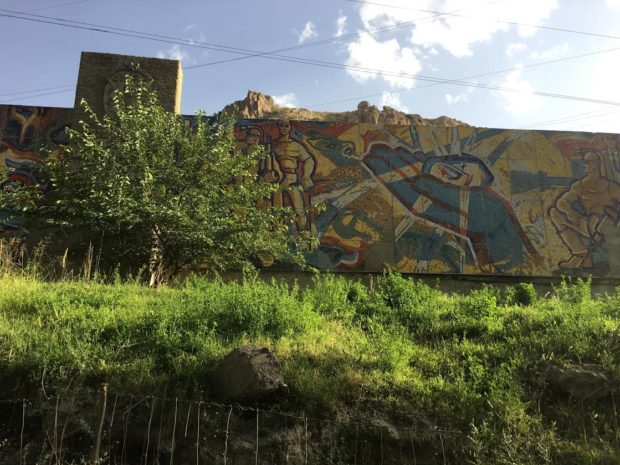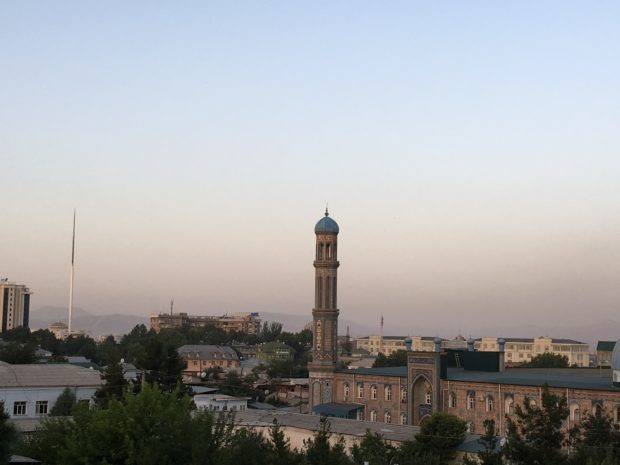You have no items in your cart. Want to get some nice things?
Go shopping
The two little girls were sprawled on cushions on the carpeted floor, napping as the television played a cartoon in Russian and the rare, very rare rain of a Tajikistan summer fell outside, creating dust clouds above the dry cement backyard and filling up the plastic kiddie pool. Parvina and I sat on opposite sides of the table, my hands full of books and papers for class, Parvina holding fabric, sewing something, busy with housework which “never ends,” as she often said with the same resignation I heard in my mom’s voice when I was little. Just like my mother, Parvina had a job and was also the main caretaker at home. I had the strangest sensation of reliving my childhood in that little house that summer, halfway across the world from where my childhood had been spent, on different cement blocks, playing in a different kiddie pool, running up and down a different alley, yelling at my brothers in a different language – and finally collapsing inside, sheltered from the heat, surrounded by the low hum of the television and scattered crayons.
Parvina, per usual, offered me food – bread, a cup of chay. I had been there long enough at that point that I was able to carry on a real conversation in Tajik, a dialect of Persian, though I was still hopelessly lost when the neighbors came over to visit. But in that moment, in the quiet, just the two of us watching over our sleeping companions, it was easier than ever to understand. Maybe in moments of sudden intimacy, words matter less – are, in fact, subsumed by the mysteries they veil with meaning in everyday life. To speak of love, and war, and grief renders language barriers almost useful. We toil side-by-side in the same patch of ground, neither knowing how and where to begin but each relieved, in part, by the limited space, the expanse automatically defined by the unknown.
And so in what was, Parvina acknowledged, a rare moment of domestic peace, she began to speak about the war of her childhood. Tajikistan’s civil war erupted when she was just 10, in 1992, after the fall of the Soviet Union. The conflict uprooted her family, and was perhaps what had killed her father, though I never had the courage to ask her directly if that was why he died in 1993, as she mentioned once. Their neighborhood fast emptied, bereft of the Bukharan Jewish families who once lived there, as they fled to the U.S. or were airlifted out to Israel to avoid further persecution.
It was a war, she said, fresh, round, dense naan in her hand, which left them without bread. No bread, she said, looking at me, eyes widening. “I remember when there was no bread,” she said again, as if to make sure I understood those simple words. I imagined 10-year-old Parvina and Bibi, as Parvina’s daughters called their grandmother, desperate for food. I thought about holding within your skin those memories of no bread, even while eating the decadent, chocolate-encrusted cake we had eaten the previous evening in celebration of the oldest daughter’s seventh birthday. I pictured Bibi shaking her head indulgently but sadly when the girls refused to eat kasha, the watery, milky pool of grain that she would serve for breakfast when there were no more eggs.
“That is why I love Rahmon,” Parvina said, bread still in hand, shocking me with her directness. All of us at school, all Americans, laughed at Rahmon and his regime, ex-KGB types, running the country with the most ridiculous gestures of authoritarianism: the billboards, the government-sanctioned “news” declaring the prosperity of Tajikistan, showing image after image of full crop fields accompanied by floating, inspirational music – even his recent declaration earlier the year before of his title not just as president, as he had been since peace was achieved in 1997, but also as “Leader of the Nation,” reminiscent in its bleak grandiosity of something straight out of the Hunger Games. We would laugh at this country, where Rahmon’s ugly visage was plastered on buildings everywhere, arms full of golden harvests, or shown strolling side by side, if not quite hand in hand, with Putin in a verdant garden, guiding each other to some kind of (not terribly religious) Eden reserved for leaders of nations, where they would then gather more wheat in their arms, stare out into horizons even further beyond the economic uncertainty of their present, and dream of the future entirely contained by this picture of themselves.

Yes, it was funny, but nothing about Parvina’s face – her mouth which so quickly smiled when playing with her children, her eyes which would light up as we talked about our mutual love of Enrique Iglesias – showed any sign of amusement now.
She explained to me as well as she could, as well as I could understand: “He is why there is bread now. He is why you, a foreigner, can be here right now.” Rahmon was not a billboard: He was a fact that meant that in her hand was the smooth, round bread, a fact that was the reason why I was sitting there, why I had boarded a plane and landed in Dushanbe, where I could play in the alley with her daughters without fear of being shot. Why my government’s heavily-weighted, paper-thin green dollars changed hands, became somoni and now could rest safely in the wooden trunk under the bed in her room.
While Americans talked about freedom and laughed at the desperateness, the contrived power of Rahmon – and at some level, it was laughter at the ignorance of the people who accepted it as their government – freedom was perhaps not the first thing on Parvina’s mind. Or maybe it was only that for her, freedom did not consist in direct challenges to the government’s strict, though finely delineated crackdown on her faith and its expressions. Rahmon, nominally Muslim in perhaps the same kind of way American presidents have been nominally Christian, had issued countless orders in recent years to close down more and more madrasas, confining Islamic expression and study out of fear of a rise of Islamism – an eastern Arab Spring, a Tajik ISIS invasion, Taliban spillover from the southern border with war-torn Afghanistan, or a burgeoning of the ideologically very different, though equally threatening, long-dormant seed of the Iranian Revolution.
Freedom – of speech, of religion, of politics, of every aspect of civil society – has been and continues to be increasingly limited in Tajikistan and several other former Soviet Central Asian republics. But freedom is also a question of bread, or no bread. Blood that, they said, flowed in the center of the capital, down Rudaki Avenue in the midst of the civil war, or no blood. Rifle shots or cartoons in the background of daily routine.
What did I understand? Of that piece of bread, of why the billboard of Rahmon sweeping through wheat fields in his shiny suit had any kind of significance? What words did I even have to discuss an authoritarianism which I never would have imagined in America that was suddenly springing up, or, more accurately, descending down upon us via a golden staircase?
The rain cleared away, and Parvina soon left to prepare iftar, which we would have after sunset at eight. I loved the feeling of relief that swept over us at that moment, even those like myself who weren’t fasting; the sun exhaled, slowly but urgently, all of the cool breath it had sucked up during the day. The sky, the trees, the muscles in people’s faces released some deep tension, becoming more like themselves, unfurling in that brief slash of time between the sun turning away and darkness blanketing all in indistinguishable shadows.
The little girls awoke and I went to play with them in the alley, in the afterglow of day. We danced and laughed and ran on the cracked concrete until Parvina emerged at the gate to call us to dinner, her hands full of bread.
About Emily Neil
Emily was born and raised in Baltimore, MD, U.S.A. She graduated with a Master's of Science from Columbia Journalism School in May 2016, and with a B.A. in Middle Eastern studies from Barnard College in 2014. She is currently the communications officer for the nonprofit SERES, which facilitates leadership and education for sustainable development processes with youth in Guatemala and El Salvador.



